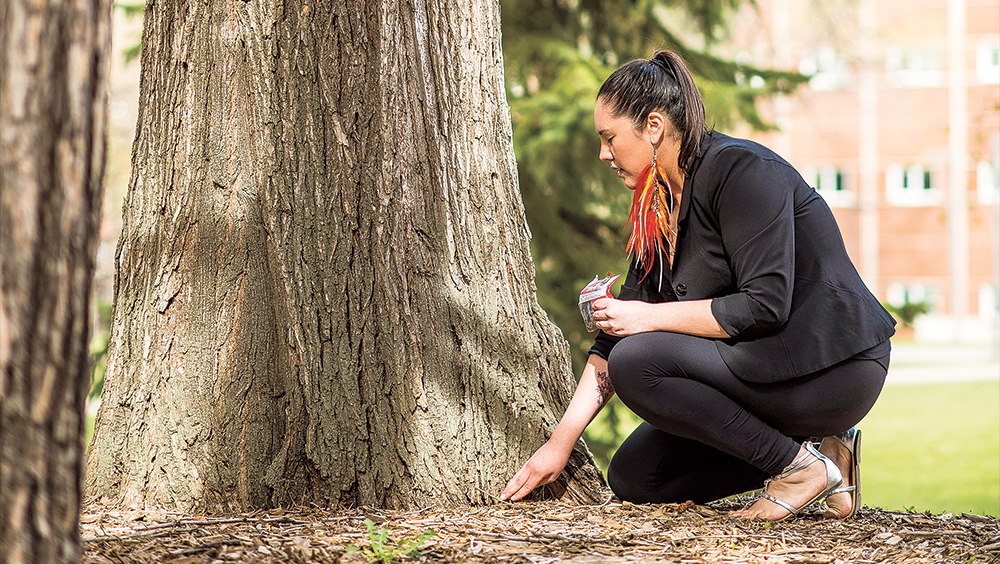
[Photo by John Ulan]
On a mild weekend evening last winter, Charis Auger joined a large round dance in a gym at the University of Alberta. Hundreds of people clasped hands and moved as one to the beat of drums. For Auger, attending the event - held in memory of Elder Marge Friedel - is a recent, yet important, tradition. Auger grew up without any connection to her Aboriginal culture. That changed when she was introduced to Friedel, a Métis elder involved with the Aboriginal Student Services Centre on UAlberta's North Campus.
"I really didn't have an identity until I met Marge Friedel," says Auger, 29, a Cree woman in her final year of an undergraduate degree in native studies.
Friedel, who died in 2011, was passionate about education and helping students stay focused on their studies. Every Wednesday morning she visited and mentored students at the centre, which offers support and services for more than 1,000 First Nations, Métis and Inuit students who attend the university.
Raised in the small northern Alberta town of Slave Lake, Auger was 17 when she had her son, Phoenix. She dropped out of high school and struggled with an abusive relationship and, later, addiction and homelessness. She didn't see herself ever going to university, but people told her she was smart, and she listened. She enrolled in an educational assistant program in the town of Athabasca and later moved to Edmonton with her son, upgrading her education while sleeping on a friend's couch. "It was quite the struggle," she says. But for the sake of her son she stayed focused on moving forward. She wanted to show him that regardless of what life throws at you, success is possible.
Auger first learned about the centre in 2010 through her involvement in UAlberta's Transition Year Program for Aboriginal students. The centre's "dream team," as she calls the staff, helped her find housing and made sure her son had a warm winter coat. It was at the centre that she met Friedel and started to learn more about her Aboriginal identity, an experience that has been life-changing.
Inside the centre, large wood columns outline various doorways. The space feels beautiful and safe to Auger, like home. One doorway leads to a smudge and meditation room, where Friedel took time to teach her how to smudge. Auger now prays to Friedel in the same room they once sat in together.
Through another doorway, a reference room contains hundreds of books on Aboriginal themes and stories. Growing up, Auger had never been taught about residential schools. It was eye-opening to learn what her relatives had endured. Her new-found knowledge also helped her better understand her own story and how the intergenerational impact of residential schools has affected her life. The centre offers a space for dialogue, she says. "First with ourselves, and then with others."
Many of the centre's resources rely on donor support, including academic tutoring, providing students with daily fresh fruit and giving new students backpacks filled with supplies. A Christmastime initiative donates gift cards to single parents, allowing them to purchase a present for their children. "I know that every single day a student is going to walk through that door and need help in some way," says Shana Dion, director of the centre. Monthly stew-and-bannock meals are integral to connecting students with each other and building community, Dion says. "It's the connections that make [the centre] so special. This truly becomes a home away from home."
For Auger, the many supports she received have helped her thrive. "It's the reason why I'm still here today," she says. "I've come an extremely long way." And even though the influential elder, Friedel, is gone, her life's work continues to guide Auger. Today, Auger's 12-year-old son attends amiskwaciy Academy, a public school where Friedel was a founding elder. The Edmonton school emphasizes Aboriginal culture, language and traditions - things Auger's parents didn't expose her to when she was growing up.
Auger recently completed a certificate in Aboriginal governance and is working on another in community service learning. She volunteers for the centre and iHuman Youth Society, keen to share her culture with others. At the recent memorial round dance, for example, she brought her mother, who had never been to one. The crowd moved together like the heartbeat of the community. It's that community - discovered within the centre, through Elder Friedel - that has lifted Auger and helped her succeed. "The centre has helped lay the foundation to where I am today," she says. "Having my culture and identity has allowed me to feel rooted. Now I can continue to grow up and reach out."
The Aboriginal Student Services Centre supports First Nations, Métis and Inuit students on their academic journey at the University of Alberta. The centre honours the Indigenous world view of education as a continuous ceremony of learning.
To learn more about how to support the centre and its programs, contact Shana Dion at 780-492-7254 or shana.dion@ualberta.ca